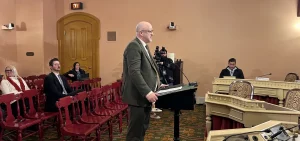News
An Ohio bill would provide savings accounts for kids attending non-chartered religious schools
By: Jo Ingles | Statehouse News Bureau
Posted on:
COLUMBUS, Ohio (Statehouse News Bureau) — An Ohio House committee is considering a new bill designed to help those who don’t qualify for that money by allowing the creation of educational savings accounts for children attending non-chartered schools – most of which are religious schools.

When lawmakers passed the $86 billion, two-year state budget last year, they expanded the EdChoice voucher program. Now, nearly all Ohio students can get public money to offset their costs for private school, even those who’ve never attended public schools. But Click said that non-chartered status means parents of those students cannot take advantage of those state-paid vouchers to offset the cost of private education.
“This means that their parents continue to pay twice for education; once through taxation and the second time through tuition,” Click said.
Click said educational savings accounts for students in non-chartered schools could be used to purchase goods and services as well as tuition.
During the first hearing on the bill in the House Primary and Secondary Education Committee, Rep. Jessica Miranda (D-Forest Park) seized on the idea that the money could be misused.
“We have seen how this works in other states. In Arizona, for instance, families who used ESA funds were using said taxpayer funds to buy things like grand pianos, video games and other high-ticket items,” Miranda said. “And then I heard recently, in Florida where they are using this program, there are families who are literally getting approval to get Disney World annual passes because they were calling that an educational expense for their children.”
Click said he “would agree that would be irresponsible.” Click said his bill contains a requirement that receipts be provided and he said there are safeguards in the process.
Click said this bill would not allow for homeschooling families to get these funds, although he added he would like to see homeschoolers get some state money in the future.
Scott DiMauro, president of the Ohio Education Association, the state’s largest teachers union, said the state needs to focus its attention on public schools, where 90% of students attend.
“This is one more voucher bill that will subsidize families who are sending their kids to private schools with zero oversight and accountability,” DiMauro said.
DiMauro said the OEA will be opposing the bill.

